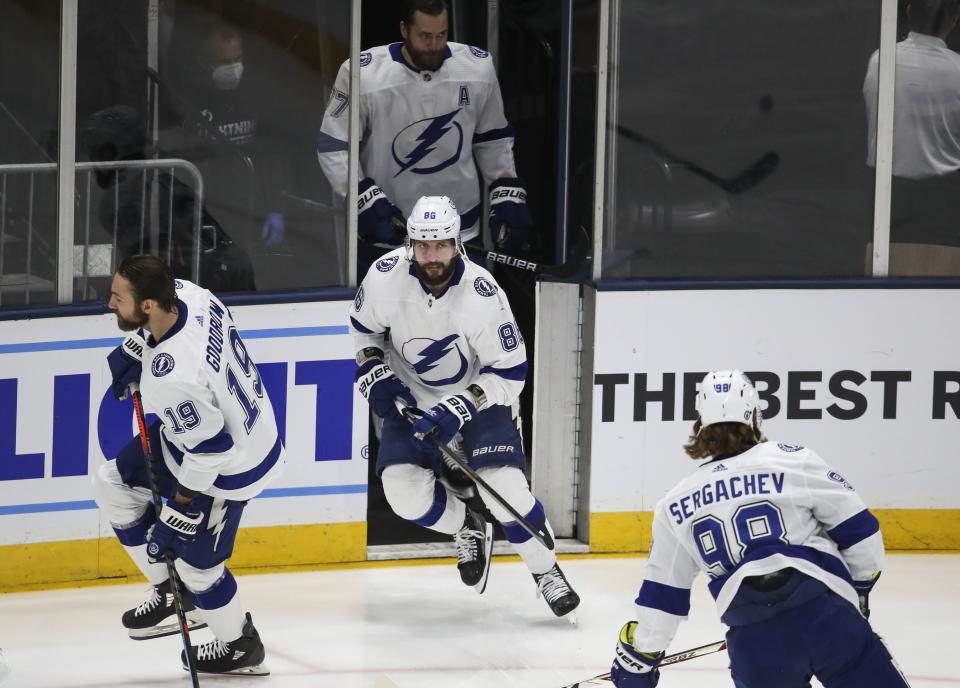How the Lightning won a Stanley Cup, then got even better
- Oops!Something went wrong.Please try again later.
- Oops!Something went wrong.Please try again later.
- Oops!Something went wrong.Please try again later.
- Oops!Something went wrong.Please try again later.
- Oops!Something went wrong.Please try again later.
- Oops!Something went wrong.Please try again later.
- Oops!Something went wrong.Please try again later.
One of the more interesting moments from Game 3 had nothing to do with any action on the ice.
It was during the second intermission when Lightning defenseman Victor Hedman was being interviewed by NBC’s Kathryn Tappen. Hedman and Jan Rutta had already scored, and Erik Cernak had set up another goal, so she asked if this was the deepest defensive unit he had been a part of.
Typically, these in-game interviews are not terribly nuanced and players go on auto-pilot because they’re in a hurry to get back into the locker room. But Hedman did not. When given a simple opening to praise his teammates, he instead recalled Kevin Shattenkirk, Zach Bogosian and Braydon Coburn, all of whom were on last year’s team but no longer wear Lightning colors.
It was a sweet gesture. Also, kind of fascinating.
Is there a difference between the 2020 and 2021 Lightning?
We tend to think of this journey as one giant step forward. The Lightning got thumped by Columbus in the first round in 2019, decided they needed to grow up and play a more team-first style of hockey, acquired a few tougher players and became Stanley Cup champions in 2020.
Score, rinse, repeat in 2021.
But is it really that clear-cut? Should there be a distinction between the group that won the Stanley Cup in the bubble last fall, and the team that is one victory from closing out Montreal this summer?
In terms of personnel, the difference really is minimal. Of the 20 players the Lightning have used this postseason, 17 were part of last year’s run. The only additions are Ross Colton, Mathieu Joseph and defenseman David Savard. Shattenkirk, Bogosian, Coburn, Cedric Paquette and Carter Verhaeghe are the significant departures.
Yet, there is a different feel. The 2020 team was on a crusade. Those players were hellbent on proving they were not some fancy-pants collection of scorers. They needed to put the ghosts of past failures behind them, and validate all the work they had done to reach that point.
This time around, the players seem more at ease. There is a difference between a team that believes it is good, and a team that understands why it is good. Last year, the Lightning believed. This year, they understand.
Coach Jon Cooper described it as the difference between the first day and last day of school. The Lightning were excited by the possibilities in 2020, and now realize the salary cap will inevitably change their makeup and vibe when 2021 ends.
“This year, it’s primarily the same guys. If there are new guys in there, they were in the organization so they kind of knew what we were all about,” Cooper said. “It’s that inner drive, that maturity level they have. To understand when you start throwing legacy around — a lot of these words that describe teams — you sit there and say, ‘They were a pretty damn good team.’
“But you really only get that moniker if you win Cups. I know we’ve won one. And nobody can take that away from us, but the determination on this group to get another one is amazing to watch.”
So how do the two Cup runs compare?
On the surface, they seem fairly similar. The Lightning went 16-6 last postseason and were stretched to six games twice. Tampa Bay is 15-6 this postseason, has gone six games once and seven games once.
But if you look a little deeper, the Lightning are actually a better team. They were fortunate last season to win a ton of close games, in particular going 6-2 in overtime. This year, they’ve only played three overtime games and have lost all three. That means they are a ridiculous 15-3 in regulation against some of the best teams in the NHL.
They are scoring a little more than last year (3.4 goals per game compared to 3.2) and giving up a little less (2.0 compared to 2.2). The power play has been much better and the overall shooting percentage is up. They have fewer turnovers handling the puck, and have made fewer trips to the penalty box. In every way a team can be smarter, the Lightning are.
Maybe that’s because Steven Stamkos has been in the lineup every night compared to his memorable cameo in 2020. Maybe it’s because Cernak, 24, and Mikhail Sergachev, 23, have grown as defensemen. Maybe it’s just the realization that what they did last season could be replicated if they were not derailed by ego or selfishness.
“It’s easy to throw out, ‘Well they’re winners and they work hard,’ and all that stuff. But let’s be honest, we changed the makeup of our team,” Cooper said. “We did that, we got a little grittier. Then the ‘skill’ guys changed their games as well to a winning formula, a winning way to play.
“And when they started getting rewarded for it, they didn’t cheat and say, ‘Okay, we’ve done that. That’s fine. Let’s go back to the way it was.’ No. the individual accolades got pushed to the side. I know it’s a cliché, but it’s true.”
John Romano can be reached at jromano@tampabay.com. Follow @romano_tbtimes.
• • •
Sign up for Lightning Strikes, a weekly newsletter from Bolts beat writer Eduardo A. Encina that brings you closer to the ice.
Never miss out on the latest with the Bucs, Rays, Lightning, Florida college sports and more. Follow our Tampa Bay Times sports team on Twitter and Facebook.


